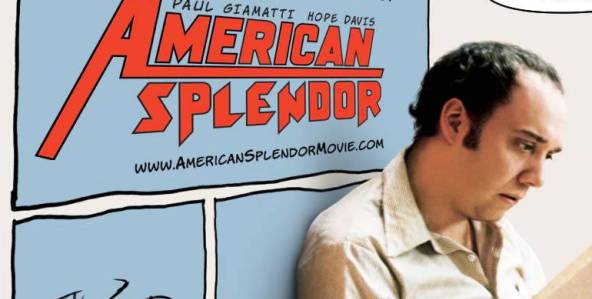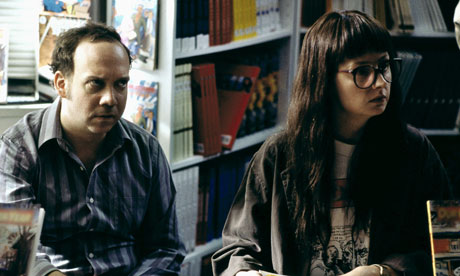
After a few weeks of circling around it, I finally caught American Splendor Thursday night and…I’m finding it a hard movie to write about. On one hand, the film works as a great introduction and overview to the weird world of cartoonist, file clerk, and now weblogger extraordinaire Harvey Pekar. (Indeed, as David Edelstein notes, with its litany of daily mundanities endured and overcome, Pekar’s comic seems an early ancestor of the blog.) The film does a great job of appropriating comic book syntax to tell its story (and in so doing makes Ang Lee’s recent flop look even worse.) And the performances are all quite good, particularly Hope Davis as Pekar’s third wife Joyce Brabner.
All that being said, I admired the film as an intellectual exercise, but never really connected to it emotionally. With a nod to Annie Hall (and of course, the original American Splendor comic), the movie breaks the fourth wall early and often and continually makes a point of its own artifice. But, as a result (and I know this was the point, made explicit with the Donal Logue/Molly Shannon sequence), much of the film came off as artificial and thus not very interesting – I found myself waiting patiently through the Giamatti-Davis scenes just to get another glimpse of the real Pekar, whose impish energy was much more engaging than anything else in the film. (Along the same lines, I thought Splendor also suffered in light of the brilliant and disturbing Crumb – James Urbaniak does a really great Robert Crumb impression, but the memory of that hard-to-forget documentary made him seem all the more like an actor doing an impression.) Moreover, once the story enters the “Our Cancer Year” period, which is obviously a crucial and necessary element of Pekar’s life trajectory, the film takes on the additional thematic weight of encroaching mortality and disease overcome, which is a far cry from the daily dilemmas and annoyances that animate the Splendor comic. As a result, the film seems to devolve in the final third into a conventional biopic. In the end, I enjoyed the movie, and particularly the first half, which feels more like Pekar’s work. But I ultimately found myself thinking that my time with Pekar might have been better spent if I had just unearthed the old issues of American Splendor and started reading. (Pekar blog link via Lake Effect.)

